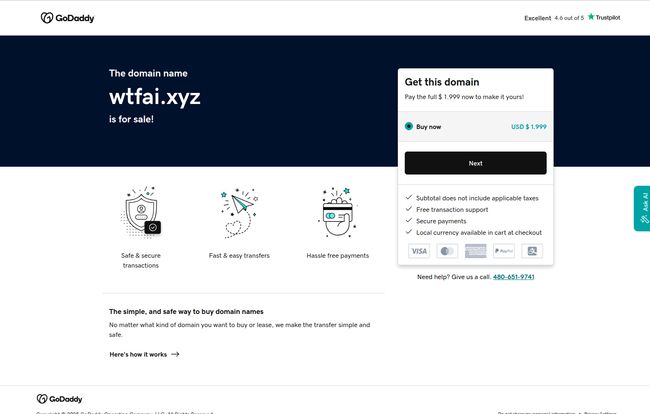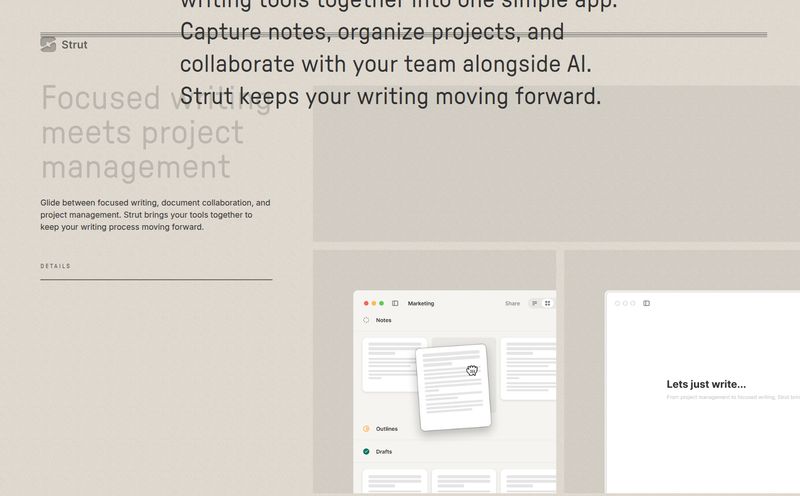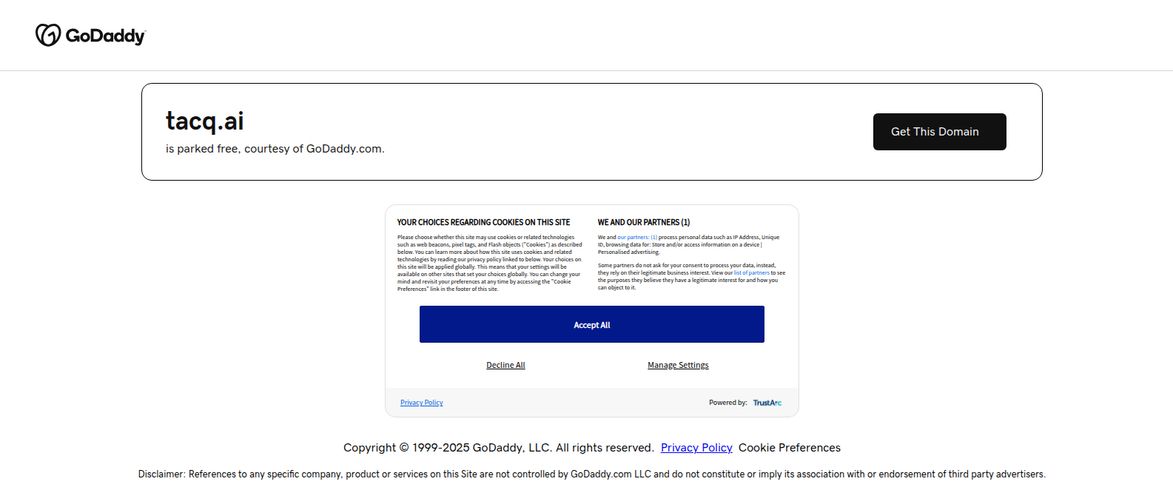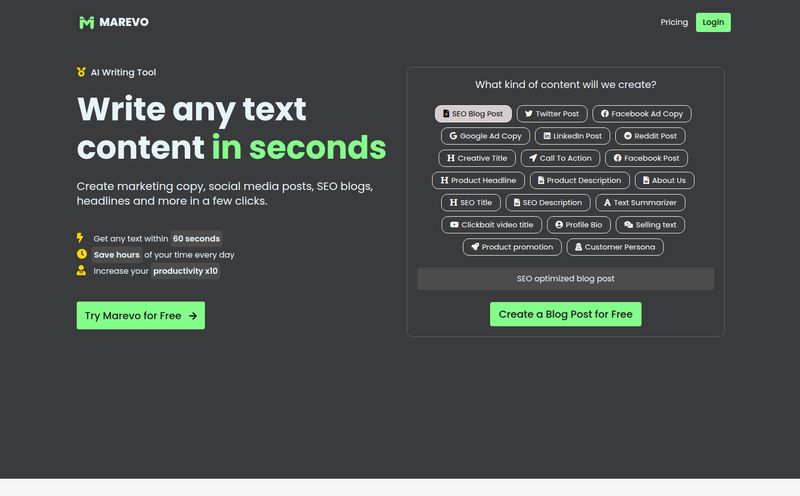You and me. As someone who's been swimming in the SEO and digital marketing pool for years, I've seen countless AI tools pop up. They all promise to revolutionize your workflow, optimize your content, and basically do your job for you. Most of them are... fine. They’re useful, but they often have the personality of a beige wall.
And then, sometimes, you stumble upon a gem. A weird, wonderful, and slightly unhinged tool that doesn't want to optimize your CPC, it just wants to make you laugh. That, my friends, was WTF AI.
I came across it a while back, probably during a late-night doomscroll session. The premise was simple and glorious: an AI built not for productivity, but for pure, chaotic social absurdity. It was designed to give you the perfect comeback, the most terrible advice, or an insult disguised as a compliment. You know, for all those times you think of the perfect retort three hours too late in the shower. I was instantly smitten.
So, I decided to write about it, to share this little beacon of internet weirdness with you. I went to pull up the site, `wtfai.xyz`, and... well. I was greeted by a GoDaddy landing page. The domain is for sale. For a cool $1,999, if you're interested. Ouch.
So this isn't just a review anymore. It's become a bit of an obituary. A digital ghost story for a tool that burned brightly, if briefly. But what it represented is still worth talking about.

Visit WTF AI
What Exactly Was WTF AI Supposed to Be?
Before it vanished into the digital ether, WTF AI was a beautiful concept. It wasn't trying to be Jasper or ChatGPT. It had no aspirations of writing your next novel or business plan. Its mission was much simpler: to be your smart-mouthed digital sidekick. It was a web-based platform that used AI to generate responses for those awkward, funny, or frustrating social moments that leave us tongue-tied.
Think of it as a pocket-sized Loki, a little agent of chaos you could consult when you needed to either diffuse a situation with humor or, let's be honest, make it hilariously worse. The whole vibe was less 'professional assistant' and more 'the funny friend who gives questionable advice'. And in a sea of sterile AI interfaces, that was incredibly refreshing.
The Glorious, Absurd Features I Remember
The beauty of WTF AI was in its very specific, very human set of generators. This wasn't a one-size-fits-all text box; it was a curated menu of social ammunition.
The Comeback Generator We All Need
This was the main event. Someone hits you with a passive-aggressive comment in a meeting? Your friend makes a lame joke at your expense? You'd type in the offending statement, and the AI would spit back a zinger. The quality varied wildly, from genuinely clever to so absurd it was funny in its own right. It was a creative sparkplug for the socially stumped.
Need Terrible Advice? It Had You Covered
One of my favorite features. Sometimes you don’t need good advice. You need spectacularly bad advice that puts your own silly problems into perspective. Wondering how to ask for a raise? WTF AI might suggest you do it via interpretive dance. It was a parody of self-help culture, and I was here for it.
Explaining Jokes and Ending Conversations
Two other niche, but brilliant, tools. The joke explainer was perfect for those moments when everyone's laughing and you're just nodding along, lost. It would break down the humor, sometimes in a way that was funnier than the original joke. And the conversation ender? A public service. It gave you creative, weird, and sometimes polite-enough ways to exit a chat you were trapped in. A true gift for the introverts among us.
The Good, The Bad, and The AI-Generated Ugly
No tool is perfect, especially one that plays with fire like this. The biggest pro was its originality. It was genuinely entertaining and pushed you to think more creatively. It was a great little tool for breaking out of a mental rut, even if you never used the comebacks it generated. It was also dead simple to use. No learning curve, just pure input-output fun.
Now, for the cons. The quality, as I said, was a rollercoaster. For every sharp comeback, you’d get five that made no sense whatsoever. And let's be real, you had to be careful. Some of the generated responses could be genuinely offensive or just plain mean. This was not a tool for serious business communications or sensitive family situations. It was a toy, and if you treated it like a serious weapon, you could definitely cause some collateral damage. I'd never actually use one of its comebacks verbatim in a professional setting, but man, it was fun to see what it would come up with.
So, What Happened to WTF AI? The Plot Twist
This brings us back to the GoDaddy page. What happens to a cool little AI project? Well, a million things. Maybe the developer got bored. Maybe the server costs got too high. Maybe they got a job offer they couldn't refuse. In the rapidly expanding universe of AI, projects like this can be like comets—blazing across our screens for a moment before disappearing.
Seeing that "domain for sale" page was like showing up to your favorite hole-in-the-wall taco stand to find it's been replaced by a soulless smoothie chain. It’s a small reminder that the internet is not permanent. The unique, quirky corners can be paved over at any moment. It's a bummer, honestly.
It also makes you think about the gold rush mentality in the AI space right now. Everyone is chasing the next big thing, the next billion-dollar model. A small, free, humor-focused tool probably isn't a great business model. But does everything have to be? WTF AI was art, in its own weird way. A piece of performance art about our own social awkwardness.
Could a Tool Like This Still Work Today?
I think so. In fact, I think we need more of them. As large language models become more powerful and, frankly, more sanitized and corporate, there's a growing space for niche AIs with a real point of view. A personality. An edge. People are getting tired of the overly polite, walking-on-eggshells tone of some mainstream assistants.
A tool that’s specifically designed for humor, for creative writing, or even for generating 'terrible' ideas has a place. It’s the difference between a Michelin-star restaurant and a greasy spoon diner at 2 a.m. Both serve a purpose, and sometimes, you just really want the greasy spoon. Maybe the original creator will see this, buy back the domain, and bring our beloved chaos agent back to life. A guy can dream, right?
Frequently Asked Questions About WTF AI
- What was WTF AI?
- WTF AI was a fun, humor-focused website that used AI to generate witty comebacks, terrible advice, insults disguised as compliments, and other creative responses for various social situations.
- Is WTF AI still available?
- Unfortunately, no. As of this writing, the domain `wtfai.xyz` is listed for sale on GoDaddy, indicating the project is no longer active.
- Was WTF AI free to use?
- Yes, from what I remember and the lack of any pricing information, it was a free tool for anyone to use, which was part of its charm.
- What were the main features of WTF AI?
- Its key features included an AI comeback generator, a terrible advice generator, a conversation ender, an insult-as-compliment generator, and a tool to explain jokes.
- Why was a tool like this useful?
- While not a 'productivity' tool, it was great for entertainment and creative stimulation. It could help people think outside the box, find humor in awkward situations, and serve as a fun distraction.
- Are there any good alternatives to WTF AI?
- While there isn't a direct one-to-one replacement, you can try to coax similar humor out of large language models like ChatGPT or Claude by using very specific, creative prompts. For example, you could ask it, "Pretend you are a sarcastic comedian. What's a witty comeback to 'You look tired'?" The results might vary, but it's worth a shot!
A Final Thought on a Funny Ghost
So, RIP WTF AI. You were too weird for this world. Your disappearance is a classic tale of the modern internet. It highlights the fleeting, ephemeral nature of creative projects and serves as a reminder to enjoy the strange, wonderful things we find online while they last. In a world rushing to make AI serious and profitable, I’ll miss the tools that just wanted to be silly. Maybe someone will pick up that domain and resurrect the chaos. We can only hope.
Reference and Sources
- Domain Sale Listing: GoDaddy - wtfai.xyz



